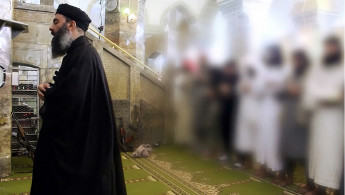Baghdadi "not among" scores of IS leaders killed Saturday
Reports have emerged that 17 leaders of the Islamic State group (IS, formerly known as ISIS) were among 31 people killed in US airstrikes this weekend.
Leading members of the armed group, which controls large swathes of Iraq and Syria, were understood to be meeting at three separate sites.
"US airstrikes last Saturday simultaneously targeted three IS locations in the town of Rumana on the border with Syria, and the Badiyat al-Jazeera region, south of Mosul, during gatherings of several leading IS figures," said a senior Iraqi ministry of defence official.
"The attack resulted in the deaths of 31 IS members, including 17 leading figures, of nationalities including Iraqis, Syrians and Saudis. 50 others were injured."
The airstrikes followed what is thought to be the first successful infiltration of the IS leadership by intelligence agents.
Prominent figures killed
"The available intelligence reports confirm the killing of 17 leading IS figures," said Major General Salam al-Saedi, a member of the Iraqi joint operations command in Baghdad.
"The US informed the Iraqi authorities about the operation after it was carried out. IS leader Abu Bakr al-Baghdadi was not among those killed in the operations," Saedi added.
Abu Mosaab al-Iraqi, described as a prominent figure in IS' Iraq division, was reportedly among the dead. It is believed that Iraqi had attended Baghdadi's July speech in Mosul's Grand Mosque, when the establishment of IS' "caliphate" was announced.
Other leading IS figures killed in Saturday's attack reportedly include Abu Ahmed al-Jazrawi and Said al-Shahri.
US planes are also understood to have bombed a number of the militant group's weapons depots.
"The strikes destroyed a large IS arms warehouse that stored missiles and various types of weapons," said Faleh al-Essawi, deputy head of Anbar's governing council. "They also lead to the burning of dozens of other arms storage facilities in both locations."
This article is an edited translation from our Arabic edition.



